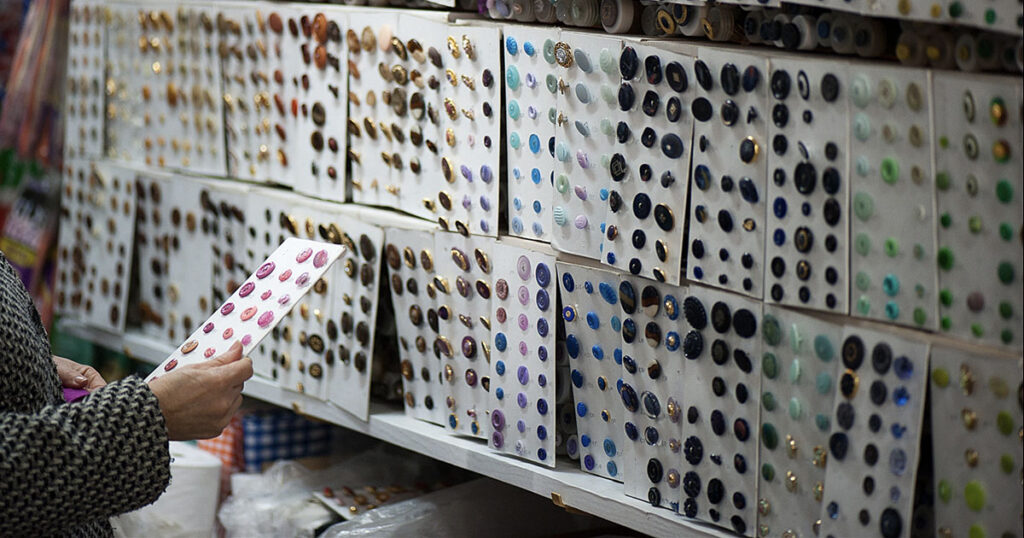
A mercería is a sewing shop. You might call it a notions shop in the U.S. or a haberdashery in the U.K. When my boys were small, I frequently bought iron-on knee patches at my local mercería, but you can also pick up a zipper, a spool of thread, or buttons, as well as socks and undergarments, usually for children. If the ferretería (a hardware store) was a man’s domain for the tools and supplies necessary to hold together the pieces of his life—a banging shutter on the house, a loose floorboard, a leaking faucet—then a mercería might be the equivalent supply store for a woman. Ascribing areas of expertise in this way, based on a person’s gender, is less and less observed. Nevertheless, although I’ve often visited a hardware store and seen other women there, I have never seen a man making a purchase in a mercería, nor attending customers in one.
As for that other traditional domain of women, the kitchen, all the gadgets and utensils you need to feed a family are at the hardware store: rubber gaskets for an espresso pot, cookie cutters, cutlery, potato peelers, measuring cups, plastic food-storage containers. I was happy to see, upon moving to La Pola three years ago, that I had a ferretería at one end of the main pedestrian street, three steps from the Plaza les Campes, and a mercería at the other end, on the corner across from the Plaza Cubierta. Both were town institutions, both were founded in the previous century, and both were family businesses, the hardware store run by the graying son of the founder, and the sewing shop still owned by the same family that started the business. Both had survived the pandemic, when many stores closed, and both had held on despite the arrival of the giant French superstores Carrefour and Alcampo and then the newer, smaller German chains Aldi and Lidl, with their weekly offers on household goods. A person sent out with a list of items to buy could get everything, from clothing to tools to food, at one of those chain stores. Contrast that experience with local shopping, stepping into the specialty shop, inquiring of the acquaintance behind the counter about a sick grandson, an old mother, a trip to Cádiz, a new car, or the evening performance last weekend of the Christmas choir. Then answering the pleasant inquiry about the item you purchased a week earlier. In a hurry, you might come bustling into the shop, but there is no rushing the person ahead of you through the round of friendly questions and comments, and no rushing when it’s your turn. When pressed for time, therefore, you’ll choose the 20-minute drive to a mall with a superstore, choosing the charmless self-checkout. Because who has time to chat about life when you need a rubber gasket or vegetable peeler? Hard enough to find time to live life much less talk about it.
Though the hardware store is going strong, the notions shop, called Casa Gorín, is no more, having closed its doors forever on the last day of 2024. It opened in the early ’30s at the same time that the monumental Plaza Cubierta was inaugurated. Ninety years later, it looked its age, dull and shrunken, almost dilapidated, a squat old-fashioned building among taller, newer upstarts.
Some 90 years—93 to be exact—was also the lifespan of Aurina Braga, who 70 years ago married one of the owner’s sons. She met him in the early ’50s, when she visited a friend who was employed at the store to darn socks. Eventually she and her husband became the owners of Casa Gorín. When he died, she kept on alone. Long after she had ceased to wait on customers, she continued to appear at the shop every morning and every afternoon. When I bought some green yarn a year ago to mend a sweater, I saw her seated in her corner, beside the enormous windows giving onto Ildefonso Sánchez del Río Street, with the Plaza Cubierta in the background. She was not doing anything that I could see other than occupying her place, observing who came in and greeting the customers she knew, which was most of them. In August, she died. Was she still coming to the shop at the end? I asked the attendant when I visited the shop a few days before it closed. Oh yes, she always came. What happens to the shop now? I wondered aloud. The heirs would sell the building, the attendant supposed. The location was excellent. Maybe it had already been sold, she didn’t know. They’ll have to preserve the building, won’t they? I asked. But no—no historic landmark designation protected the building. A one-story construction, it was worth much less than the site it occupied. The building would likely be torn down to make room for a newer, taller building, as other relics had been. What a pity, I said. The attendant nodded. She was 60 and had been at the store for 42 years, she told me, and her sister—here she indicated the other attendant, listening to our conversation and nodding—had been there 39.
I had gone in wondering what would become of the building and left wondering what would become of the two sisters. They would likely outlast the building, unlike the founder and the founder’s heirs. They might just decide to consider that a bit of luck.

